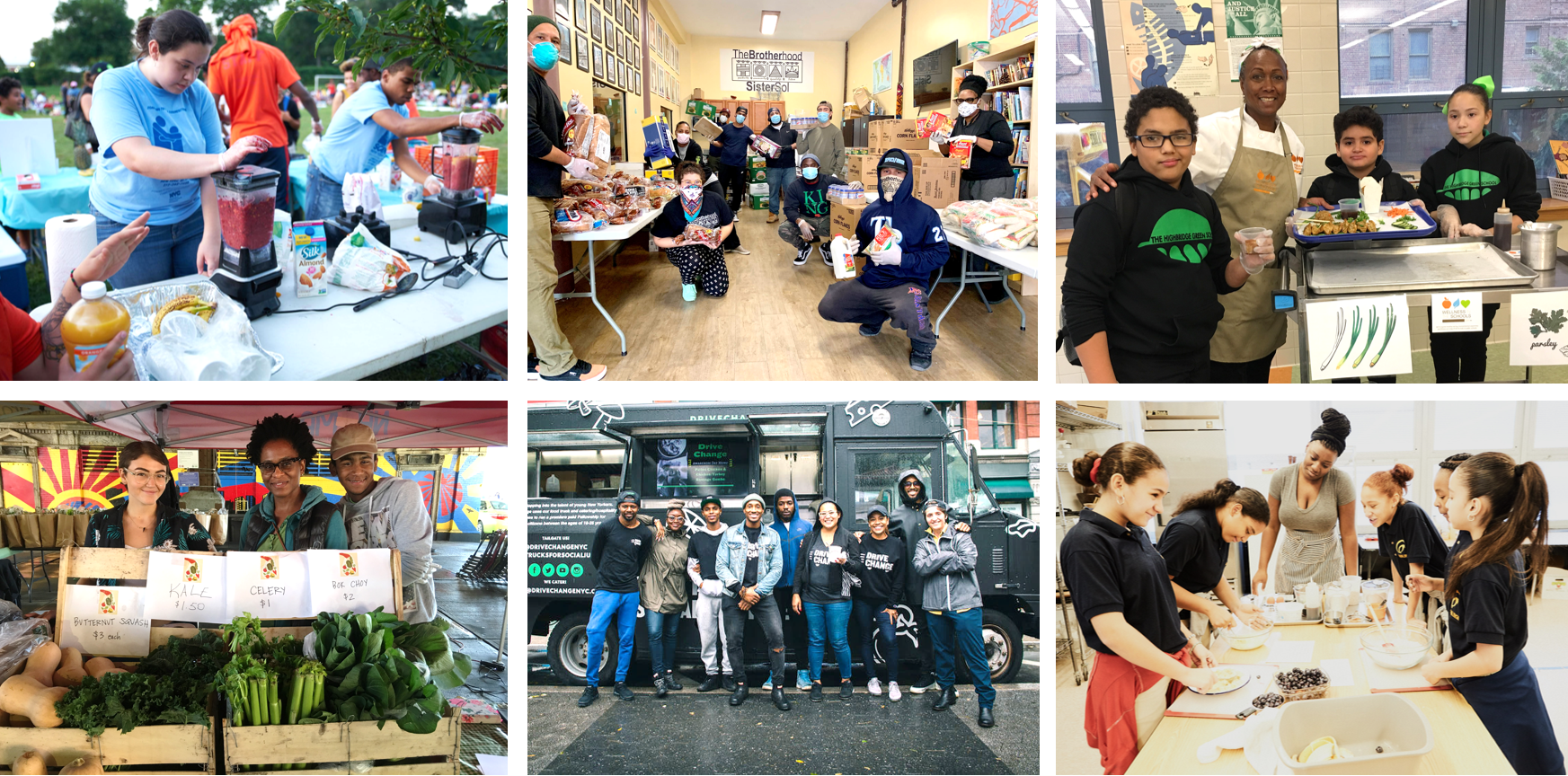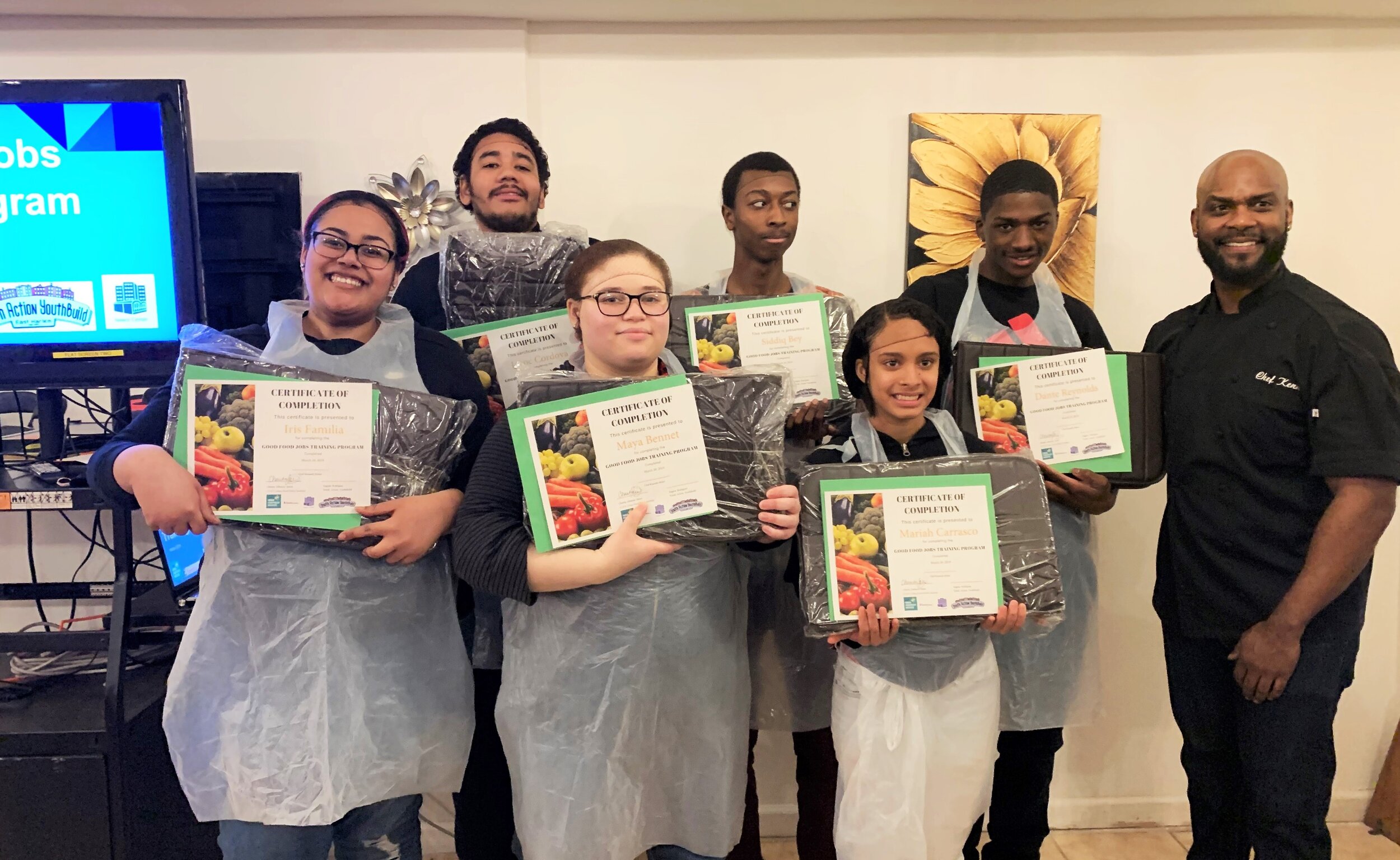In our effort to track how food-related organizations are coping with COVID-19, we are publishing a series of frontline reports based on conversations with staff at these groups. See Part 1 here.
On April 8, 2020 the CUNY Urban Food Policy Institute hosted a virtual meeting where youth-serving and food community-based organizations and non-profits described how they are adapting their programming and approach in response to COVID-19. The current public health crisis has brought on and exacerbated food access, mental health, and financial problems for many, prompting organizations to quickly switch gears to address new needs. The conversation uncovered various strategies that have helped organizations maintain engagement and connect individuals to resources during these troubling times.

Clockwise from the top left: [1] Youth-led Event by SCAN NY – Image courtesy of SCAN-Harbor; [2] Free food distribution by the Brotherhood/Sister Sol – Image courtesy of the Brotherhood/Sister Sol; [3] Healthy Food Preparation and Nutrition Education by Wellness in the Schools – Image courtesy of Wellness in the Schools; [4] ESYNYC Cooking Class at P.S. 7 – Image courtesy of Edible Schoolyard NYC; [5] Drive Change Fellows – Image courtesy of Drive Change; [6] Fresh Food Box @ Uptown Grand Central – Image courtesy of Uptown Grand Central.
Adapting Programming
All of the organizations represented at the meeting have transitioned their programming to virtual means. Google Classroom, Zoom, YouTube, and Instagram have been used to share content and programs. Many organizations mentioned that Zoom’s video function has helped to maintain some normalcy with participants. Wellness in the Schools has been using social media (Instagram and Facebook) as well as a new technology platform (Famer) to share videos of simple exercises and recipes. Edible Schoolyard NYC (ESYNYC) has launched “Edible at Home”, a virtual learning hub and resource that contains gardening and nutrition content for youth. They are also considering using Flipgrid which would allow them and their students to exchange video messages. Randall’s Island Park Alliance’s (RIPA) website allows people to explore their park, urban farm, and gardens while in the safety of their own homes. Some organizations have even adapted the goals of their programming to better cater to their members during this time. For example, in addition to providing nutrition education and recipes, Harlem Children’s Zone (HCZ) Healthy Harlem team is focusing more on offering wellness tips to their members.
Sharing Food & Resources for Free Food
Food access problems have escalated, adding stress to many households. Many people have lost their jobs and food availability has been reduced in neighborhoods throughout NYC and the country. For many organizations, connecting their members to free food has become a priority. For example, the Brotherhood/Sister Sol (Bro/Sis) is offering free food bi-weekly to their students, their families, and local community members (see a video of their COVID-19 emergency food relief efforts here). The organization is also loaning laptops and hotspots to its members so they can stay connected and participate in their respective school programs virtually. SCAN-Harbor is working to bring more food to families living in the New York City Housing Authority (NYCHA) developments where they hold their programs and hope to become a food distribution site in the near future. HCZ prepared 4,000 packages of non-perishable food items and distributed these packages to families at its Promise Academy locations. Click here to see HCZ staff in action and hear the perspectives of their community members. The group also set up a Resource Hub that includes links to income support, housing resources, health and wellness access, and other resources that may be needed.
Providing Encouragement & Financial Support
By reaching out to their funders, and asking for donations via social media, Drive Change raised approximately $45K within weeks to support 26 of its former Fellows who were terminated from their food jobs due to COVID-19. ESYNYC, RIPA and Wellness in the Schools have been spreading joy, resources, encouragement through their newsletters. HCZ has been using the messaging app, Slack, to stay connected with its staff and to create a space for them to vent about COVID-19 related issues and encourage wellness. Wellness in the Schools created a WhatsApp chat solely for non-leadership staff to decompress. SCAN-Harbor sends check-in text messages to students. Bro/Sis holds weekly one-on-one check-ins and workshops with their members via Zoom, letting them know that the organization is available when needed.
How Can CBOs and Non-Profits be Supported During the COVID-19 Crisis?
Participants in the meeting suggested that organizations need support in advocating against anticipated budget cuts and for additional funding. Funders should be flexible with resources, grant deliverables and expectations, they urged. They should also give organizations the security that funds are still going to be awarded in a timely manner, consider awarding more resources, and rolling over any awarded funds that are not spent to the next year. Numerous community-based organizations and non-profits are making it easier for people to donate through their websites and via digital wallets i.e., Venmo.
The current public health crisis has challenged the operations of community-based organizations and non-profits, but that has not deterred them from continuing to provide resources and services to their members. The work of community-based organizations is even more integral during this time when the needs of many have increased. Many thanks to all of the organizations that continue to be a light and resource during this time. A special thanks to all of the organizations participated in the peer learning meeting: Drive Change, Randall’s Island Park Alliance, Harlem Children’s Zone, Children’s Aid, Wellness in the Schools, Edible School Yard NYC, SCAN-Harbor, and The Brotherhood Sister/Sol.
By Charita Johnson James, Director of Youth and Community Projects, CUNY Urban Food Policy Institute
Image on top of the page: Alumni of the CUNY Urban Food Policy Institute’s 2019 Good Food Jobs Training Program, in partnership with Youth Action YouthBuild & Stanley M. Isaacs Neighborhood Center.
